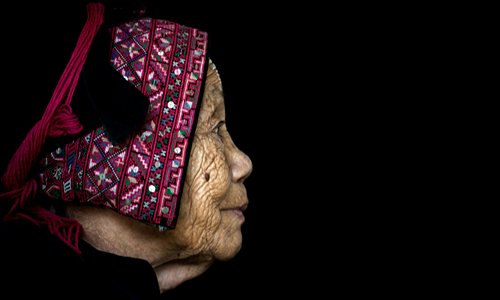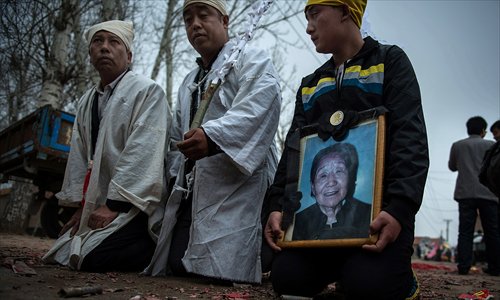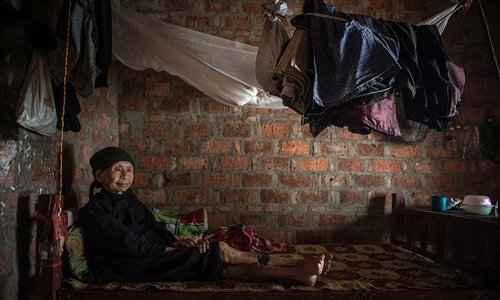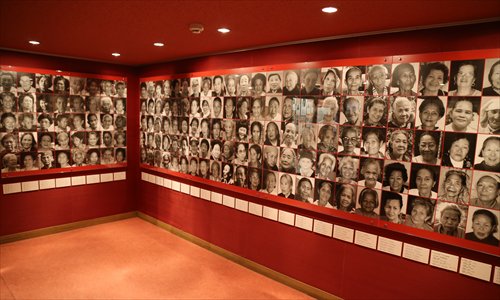HOME >> CHINA
Japan struggles to deal with legacy of comfort women system, compensation
By Catherine Wong Tsoi-lai in Tokyo Source:Global Times Published: 2015-8-6 19:38:01

Deng Yumin, aged 90, was abducted and forced to be a comfort woman when she was 16. Photo: CFP

The funeral of Li Xiumei. She was one of the first comfort women to sue the Japanese government in 1995, but never received an apology. Photo: CFP

91-year-old Huang Youliang, who was a comfort woman in 1942, rests in bed in her home in Lingshui county, Hainan Province in 2014. Photo: CFP

In July 2014, a Tokyo museum launched an exhibition that explains the atrocities the Japanes army committed against sex slaves in many parts of Asia. Photo: CFP
"It has been twenty years since I first devoted myself to this issue. As a woman, I can feel the suffering that the victims experienced, and find this violation of women's basic human rights unacceptable. This is why I have been working on this cause," said Noriko Omori, a lawyer working on behalf of comfort women, who were forced into sexual slavery by the Japanese Imperial Army during World War II.
Omori is one of the few people in Japan who are keeping these memories alive and are trying to make amends. Since 1994, she has been engaged in compensation lawsuits filed by Chinese victims against the Japanese government.
Omori has chosen a lonely path. "Many of my lawyer friends are surprised to find out that I have taken on the cases, and said to me 'it's not an easy job!'" she recalled.
Omori became a lawyer in 1968, and later represented a historian called Saburo Ienaga in a lawsuit against the Ministry of Education after a textbook he published on the truth behind Japan's wartime history was censored and banned by the ministry.
During the research she did for the case, she came to realize that the lack of knowledge and understanding the Japanese people have of wartime history is a result of Japanese history education. Seeing that many people were not aware of Japan's wartime aggression, she became one of the founding members of a group set up in 1994 to investigate the truth and inform Japanese society, Omori said.
Omori's group consists of about 15 Japanese lawyers who are currently working with lawyers in China to investigate the cases of comfort women. The Chinese lawyers are mainly responsible for collecting evidence, while the Japanese lawyers are responsible for filing lawsuits against the Japanese government based on the evidence.
The lawyer also recalled that during her trips to China's Shanxi and Hainan provinces, many victims were reluctant to talk about the past due to pressure from their families, neighbors and sometimes even the government.
Despite her persistent efforts not having paid off yet, Omori said she will continue the fight. "I have never thought of giving up. I am encouraged when some of the former comfort women pluck up their courage and eventually decide to stand up for their rights and sue the Japanese government. We have a moral obligation to these victims, and should never give up the pursuit of justice and truth in face of adversity," she said.
Attempts at making amends
"Since the normalization of Sino-Japan relations, many in Japan have argued that the historical problems between the two countries have been solved," Haruki Wada, historian and professor emeritus at the University of Tokyo told the Global Times.
"This is an unhealthy trend in Japan. We cannot forget what has happened in the past. Japan must show its sincere desire to reconcile with other countries," he said.
Besides being an authority in Northeast Asian studies, Wada was also the executive director of the now defunct Asian Women's Fund (AWF), the only organization created by the Japanese government to distribute compensation to former comfort women.
In 1995, on the occasion of the 50th anniversary of the end of WWII, former Prime Minister Tomiichi Murayama released a statement in which he expressed "deep remorse" over Japan's wartime colonialism and aggression on behalf of the government, and apologized in particular to the victims of the imperial Japanese forces' comfort women system of sexual slavery, which was later widely known as the "Murayama Statement."
"The Japanese government conducted an investigation and accepted responsibility for the violence and the damage it did to women. But the form of apology was yet to be decided at that point," Wada said.
The AWF was established the same year to offer monetary compensation, health services and welfare support to the surviving victims. "The AWF has translated the Murayama Statement into concrete actions," said Wada.
Seeking compensation
As people in Japan's neighboring countries begun to more openly discuss WWII in the 1990s, individual efforts to seek compensation first emerged in South Korea, and later spread to China and the Philippines.
Wada said that at that time, many in the Japanese government believed that the issue of the affected countries' rights as nations to seek compensation had already been settled by previous agreements reached between the governments. In China's case, many officials believed that after the Sino-Japanese Joint Statement was signed in 1972, China relinquished its right to claim compensation at all levels, including the individual level.
"The government decided that it is not appropriate to pay compensation in the name of the government, and therefore decided to raise the money through public donations," Wada said.
The AWF at that time planned a two-phase settlement plan - first offering compensation and an apology letter from Murayama for the victims in South Korea, Taiwan and the Philippines, before proceeding to the second stage for Chinese and Indonesian victims.
After a total of 330 million yen (equivalent to $6.4 million today) was raised from the public, Wada said the Japanese government decided to secretly pump another 300 million yen into the fund.
As the victims did not know that half of the money came from the Japanese government, the arrangement drew a backlash as victims in South Korea and the Philippines were outraged at the government's lack of sincerity.
"They questioned the fact that while the Prime Minister would send an apology letter, the compensation fund was raised entirely by the public. But it was not the Japanese people's responsibility as they were not the ones who initiated the war," said Wada.
The use of terms for "compensation" was another controversy surrounding the AWF.
"The Ministry of Foreign Affairs (of Japan) at that time was worried that the use of 'atonement,' which is a strong word, would bring never-ending obligations to Japan, and therefore decided to use the milder and more ambiguous word of 'compensation,'" he said.
This too drew criticism from China and South Korea as people doubted the sincerity of Japan's apology.
Due to the backlash and the diminishing support of the government for these efforts after the current Prime Minister Shinzo Abe took office in 2006, the AWF was eventually dissolved in 2007, leaving their work unfinished.
Abe is expected to make a speech on August 15 to mark the 70th anniversary of the end of WWII, and he will be closely watched by a number of countries. The Prime Minister said in April during his visit to the US that the comfort women were "victims of human trafficking," but failed to acknowledge who was responsible for the crime.
Continuing his unaccomplished mission, Wada recently joined nearly 200 academics, journalists, lawyers and rights activists in signing a statement which asked Abe to apologize for the country's imperialist past and offer to compensate victims of its wartime brothel system.
Hidden history
Despite their efforts, some groups and politicians in Japan have understated Japan's responsibility for the war, with some even insisting that historical events and issues such as comfort women and the Nanjing Massacre are fabrications.
The mayor of Osaka Toru Hashimoto courted controversy in 2013 by claiming that there is "no evidence" that the Japanese government forced tens of thousands of women into sexual enslavement during WWII, after he had previously said that the so-called "comfort women" were "necessary" for Japan's wartime troops.
During the Global Times reporters' visit to Japan in July, at the entrance of the controversial Yasukuni shrine, the reporters were approached by a young girl who is a member of a new religious organization and political party called Happy Science.
The young girl was with a few other Happy Science members that had set up a booth to collect signatures for their petition against "fake history."
"I don't know how to explain to you, but the comfort women issue is not real. And we are now collecting signatures so that we can send it to the government to address this issue," said the young girl, who was having a difficult time in explaining the cause of her campaign.
This girl is one of many Japanese youths that do not know the truth of the sexual violence committed by the Imperial Japanese Army in occupied territories during WWII. This is because the history of atrocities has been understated or even distorted in Japan.
"When our kids turn on the TV, they think it is very strange and ask why the Chinese and Koreans don't like us. They don't know it is because our wartime history, such as the existence of comfort women, is never taught in school," a Japanese mother told the Global Times.
"Instead of hiding [the wartime history], it is better to educate our kids on what Japan did to other Asian countries during the war, so as to pave the way for peace," said the mother who brought her two daughters, one 7 years old and the other 11, to a recent protest against the Japanese government's change in its security policy for a real-life lesson on history and current affairs.
A poll conducted by Japan's Asahi Shimbun newspaper, which surveyed 3,000 young people aged around 20, shows that only 13 percent said they thought that the focus paid to wartime history in Japanese schools is sufficient, while nearly 80 percent said that schools did not teach the topic well.
"Scholars in Japan have been facing increasing pressure from the government, right-wing nationalists and the education ministry with their revisionist approach to minimize Japan's responsibility during the war," Jeff Kingston, Director of Asian Studies, Temple University (Japan Campus), told the Global Times.
Kingston, one of the academics who has signed the petition with Wada, pointed out Abe is "backsliding on Japan's war responsibility, in particular on comfort women issue," and that he has tarnished Japan's international reputation.
"These memories of the war are now globalized," said Kingston. "No country has the right to change history, to backtrack from its previous acknowledgement," he said, citing the fact that Japanese politicians have been undermining the statements made by their predecessors such as Murayama and the then Chief Cabinet Secretary Yohei Kono in 1993.
Newspaper headline: An uncomfortable truth
Posted in: In-Depth